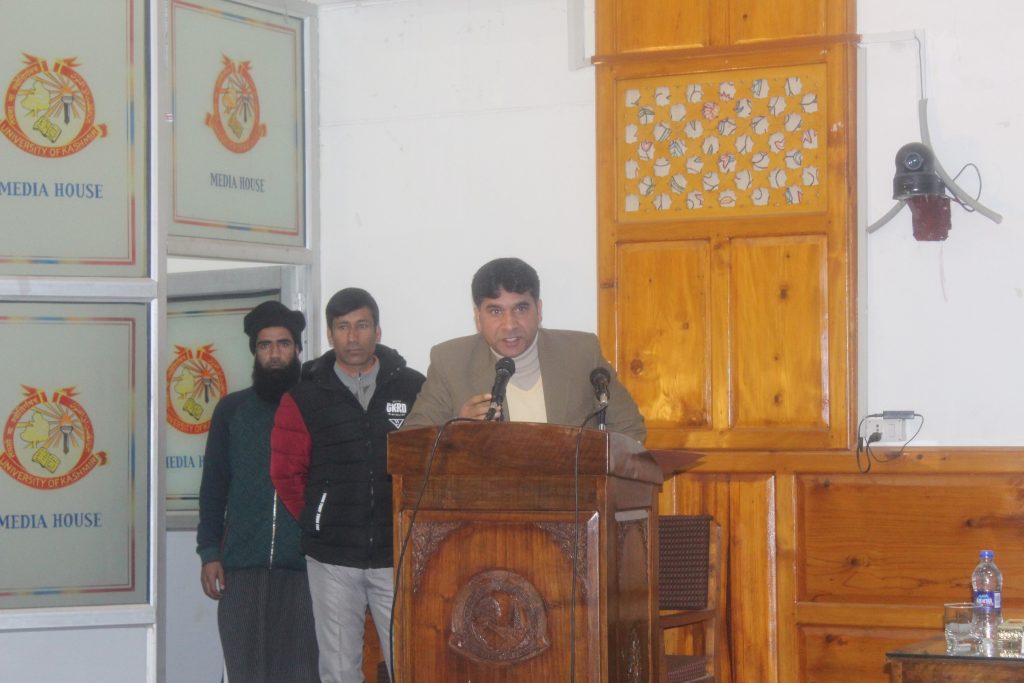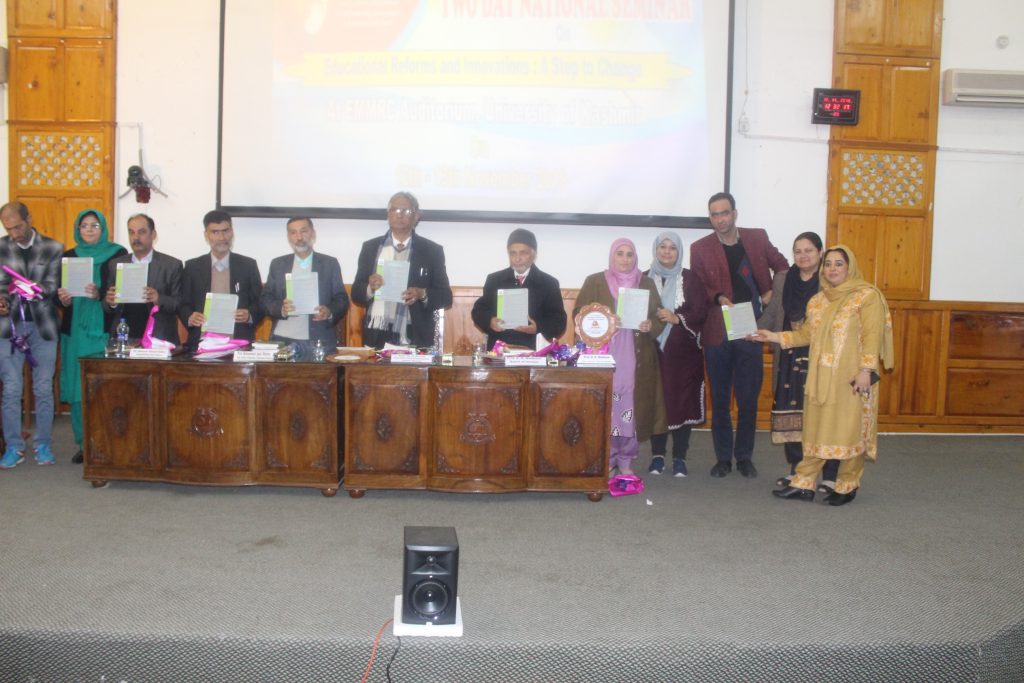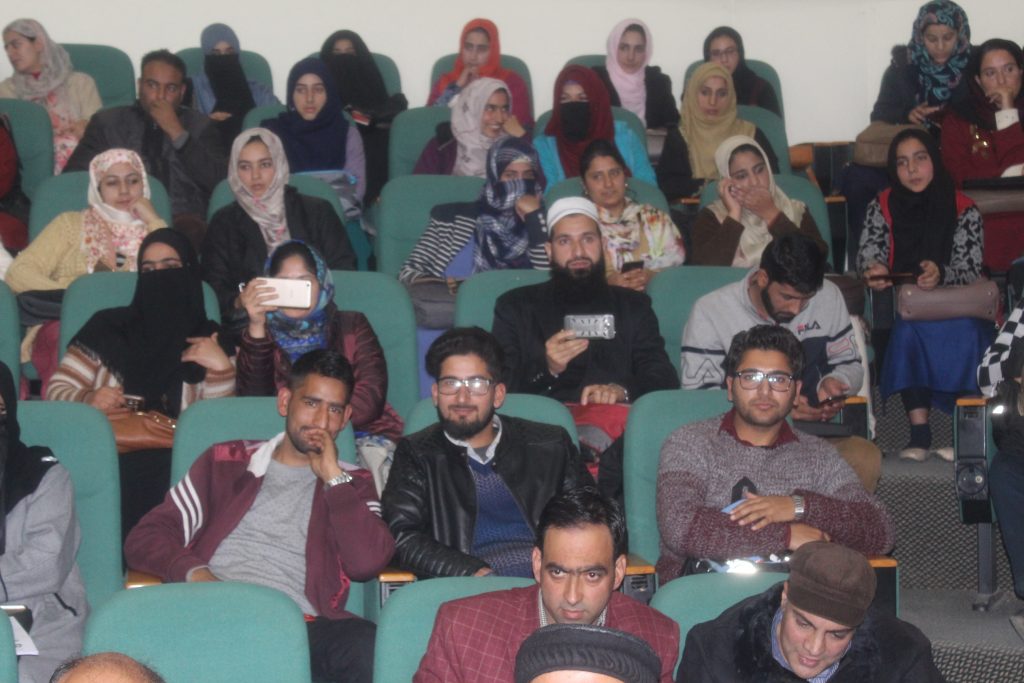P.G Department of Education of University of Kashmir Observes National Education Day
Reports: Saif Ali Budgami
Annually since 2008, November 11 is being celebrated as the National Education Day in India to celebrate the birth anniversary of independent India’s first education minister – Maulana Abul Kalam Azad.
Simultaneously, P.G Department of Education of Kashmir University has been in the domain paying overwhelming tributes to the International Education Reformist icon as well.
In accordance with the same the P.G Department of Education coordination of Dean of the Department Prof Iqbal Ahmad Matto, Prof Manzoor Ahmad followed by other colleagues organised two Day National seminar on “Educational reforms and Innovations, A step to change” The theme of the seminar was divided into sub-themes viz: Maulana Azad and Modern Education, Elementary Education, ICT in Education, Examination Reforms, Innovative Practices in Teacher Education, Inclusive education, MOOCS and E-learning and Student Support Initiatives.
In the beginning scenario of the seminar Prof.Talat Ahmad, the vice chancellor, of University of Kashmir divulged the qualities of the ideal teacher added the line that “Focus of education should be to produce informative human being”.

Furthermore the Guest figure of the event Prof A.G Madhosh, stressed the importance of association of training and skill with education referenced the Developmental Education System of China, Japan and other develped countries. He adorned the speech adding “We need to engineer teacher’s behaviour inserting such caliber, etiquettes and values so that the delivery of knowledge meets the actual goal of life and a meaningful exercise”.
After inaugural session five concurrent technical sessions were conducted in which 72 participants presented their papers. A good number of recommendations were pooled from these technical sessions.
The general future reforming headings added. Regarding examination it was recommended that the number of short answer type questions, multiple choice, matching questions may be included.
And for the stunt upliftment and development of the system some Books were released in the noon session. Which include Education for socail Empowerment
by GST.RN. Ghanian, Educational Guidance and counseling by Prof M. I. Matto & Hafsa Jan,
ICT in Education Noorul Amin.
The initiatives mulled with examination reforms include: Curriculum Development and Streamlining Examinations, Curriculum Flexibility and Student Mobility, A Common National Test for Institutions of Higher and Professional Learning, Use of ICT in Examination Management.

Derth need for more training opportunities in the field of ICT. The time’s demand for posterity include the Government to ensure that all teachers receive adequate training. Training should not merely focus on basic of ICT skills but should also present methods for integrating ICT in teaching and learning. In addition, training should be in the form of continuous professional development courses with flexible training hours as well as in school training.
The current constraint being in the list of major hindrance to ICT use, authorities ought to provide extra guiding panel for teachers to expertise their new ICT skills, design methods to integrate ICT in their teaching.
Adding Information and Communication Technology can be included as a core subject at B.Ed and M.Ed courses. The curriculum designers should integrate ICT as one of the units in each subject which will help the teachers to develop learning materials for each subject
Secondary school teachers should come forward and try to adopt and accommodate Information and Communication Technology in their professional life. It will improve the quality of education. The government and management must support them by giving financial assistance to buy information technology equipment. The education department should conduct workshops and training in the field of ICT in order to prepare the secondary school teachers as digital engineers.
Further Many studies have shown that effective use of e learning could help increase student motivation engagement, and attendance. It should also increase student class participation, and improved behaviour and performance on core subjects.
Many studies have shown that non IT students need to increase the level of their technological and communication skills to be able to benefit significantly from the opportunities offered by e-learning.
In order to maintain the quality of the courses offered via E-learning, faculty members and instructors must review and modify the teaching approaches used in traditional courses. Moreover, new educational approaches must be adopted.
Education is not preparation for examination but preparation for life. There should be paradigm shift in curriculum designing, teaching techniques and assessment process by redesigning pedagogy, encouraging faculty to have the link with the real world through research.
The event was concluded with the warm oaths and responsibilities to be shouldered by the teachers embracing such influencing recommendations to Revolutionize our Education system. Thus all assignees pledge to keep no stone unturned to pay their best for the betterment of the generations getting engaged in this System as teacher or learner. Encouraged the organizers to continue such revolutionary steps to advance and develop the system ahead.



Comments are closed.